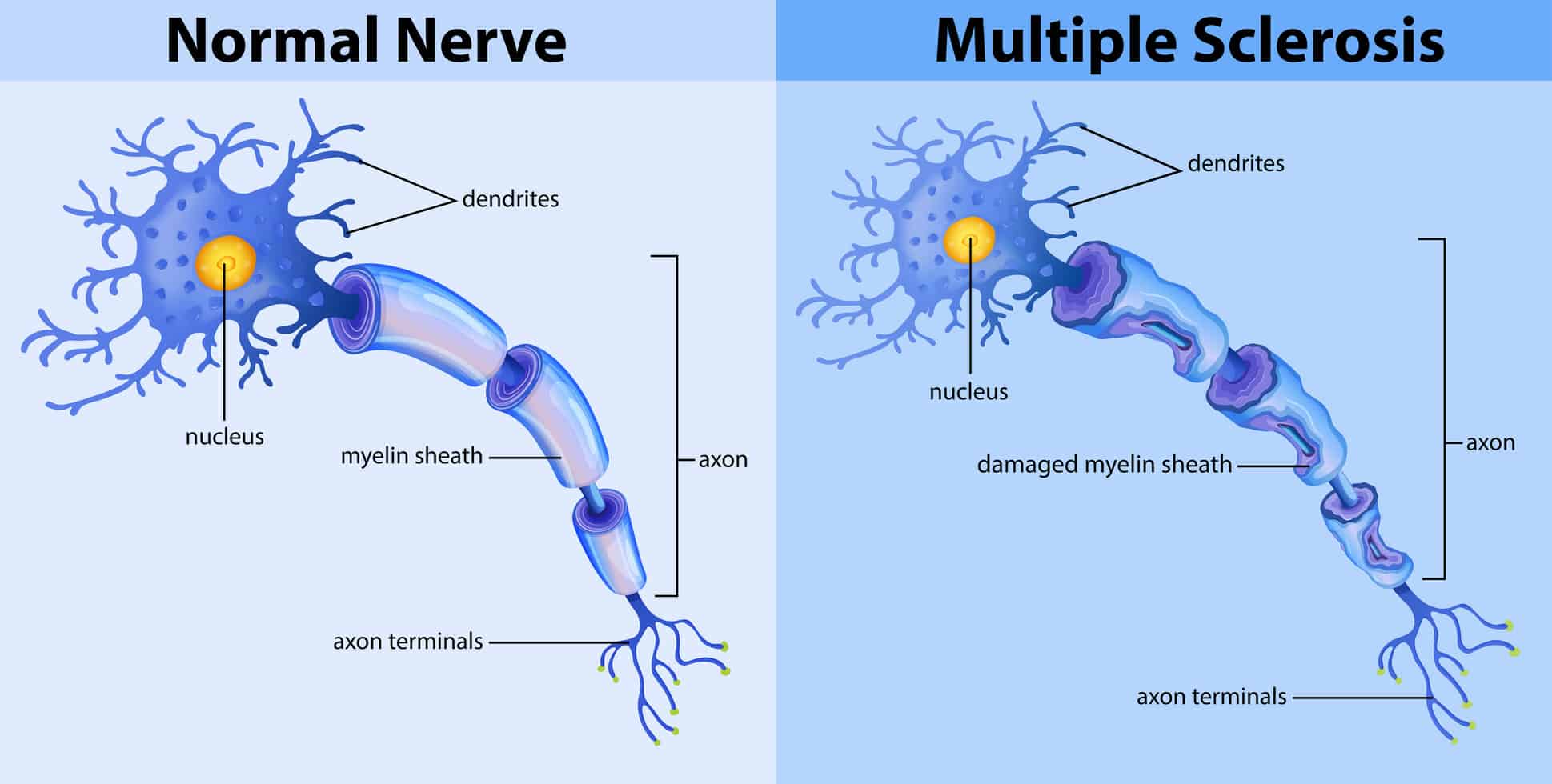Multiple Sclerosis (MS), as defined by the National Multiple Sclerosis Society, “is the most pervasive incapacitating neurological condition typically occurring in young adults globally.” However, anyone regardless of his age can acquire MS. Also, as earlier mentioned, most people who get the diagnosis between the ages of 20 and 50. MS has three types: Relapsing, remitting, and progressive MS. And, even though there are certain types, MS course is unpredictable.
Incidentally, researchers haven’t fully understood the main cause of Multiple Sclerosis. Its progression rate is difficult to identify, either. But the good news is that a lot of individuals with MS do not progress into serious disabilities. In fact, most of them even live a normal or almost-normal lifespan.
How does one acquire MS?
Essentially, the exact reason why an individual acquires MS remains unknown. Medical research says it is not caused by anything one has particularly done. More so, it is not even clear whether the condition is preventable or not. What’s clear so far, is that MS is a result of a combination of environmental and genetic factors.
Moreover, multiple sclerosis is an autoimmune condition. Meaning, one’s immune system mistakes a portion of his body for an unknown element and attacks it. For MS, it is attacking the spinal cord and the brain’s myelin sheath. This is the layer surrounding the nerves, shielding them and helping the electrical signals to travel from the brain going to all other parts of the body. Furthermore, multiple sclerosis attacks are causing inflammation in small patches (lesions or plaques) of the myelin sheath, which the MRI scan can display.
The said inflammation patches can interrupt the messages that travel along the nerves. More so, it can jumble them, slow them down, stop them from completely getting through, or send them incorrectly. In connection to this, the said interruption results in indications of MS. When the inflammation disappears, it can leave scars on the myelin sheath also known as sclerosis. Such attacks, specifically if repeated and frequent, can ultimately lead to permanent impairment to the underlying nerves.
What are the common Multiple Sclerosis symptoms?
Since multiple sclerosis occurs in different types, symptoms may vary, too. However, there are common warning signs you might want to monitor. Here are some of them:
• Feeling of Fatigue
This symptom takes place in approximately 80% of people. It can considerably interfere with the capability to operate or perform at home and work. More so, it may be the most prominent indicator of an individual, who otherwise has minimal activity restrictions.
• Difficulty in Walking
Finding it difficult to walk is in relation to numerous factors such as loss of balance, weakness, spasticity, fatigue, and sensory deficit and fatigue. Relatively, it and can be addressed with medications, assistive therapy, and physical therapy.
• Difficulty with Visions is Another Indication of Multiple Sclerosis
For many people, this can be the first symptom they’d feel. Vitally, the start of blurred vision, pain on eye movement, and color vision or poor contrast can undeniably be frightening. More so, it needs prompt evaluation.
• Weakness
Weakness one experiences in multiple sclerosis, which leads to deconditioning of damage to nerves or unused muscles, is manageable with strategies for rehabilitation. Additionally, the use of assistive devices and mobility aids are also other rehab tactics.
• Numbness of Some Body Parts
One is likely to have MS when he feels some numbness on his face, arms, and legs, or body.
• Spasticity
These multiple sclerosis symptoms pertain to the feeling of stiffness, as well as a great range of involuntary muscle spasms. Essentially, spasticity can take place in any limb. However, it is much more typical in the legs.
• Problem with the Bladder
The malfunctioning bladder, which takes place in at least 80% of people who have MS, is typically managed successfully through fluid management, intermittent self-catheterization, and fluid management.
• Multiple Sclerosis can Have Dizziness or Vertigo for a Symptom
Individuals with multiple sclerosis may feel lightheaded or. Sometimes too, they may feel some sense that there is spinning around them.
• Bowel Issues
Constipation has been an issue which individuals with MS are experiencing. Those who have the illness can manage their condition through adequate intake of fluid, medication, diet, and physical activity.
• Experiencing Itchiness and Pain
Patterns of pain are typical in multiple cases of sclerosis. Relatively, the research study has it that around 55% of MS patients go through medically significant pain at certain times, and nearly half are experiencing severe pain.
What are the causes of multiple sclerosis?

There is no clear cause for the immune system to attack the myelin sheath. Seemingly, it is partially caused by genes one inherits from his parents. Also, other causes can partially come from outside factors that may activate the condition even more. As mentioned, there may be no specific and proven causes of MS occurrence. However, some of the factors are suggested to be the possible causes of the condition:
- Genes – the chance of someone’s child or sibling with multiple sclerosis has an estimate of 2 to 3% chance of acquiring MS.
- Inadequate exposure to sunlight and lack of intake of Vitamin D
- Viral Infections – Science and medical experts have recommended that infections, specifically those Epstein-Barr virus cause might trigger the immune system, resulting in multiple sclerosis in some people
- Smoking – Undoubtedly, individuals who are smoking are about double as possible to acquire MS than those who are not smoking.
- Obesity among teenagers – Someone who was obese during his teenage years has a high risk of acquiring MS.
How to treat Multiple Sclerosis?

As in the causes, there is also no specific cure for MS at present. Nevertheless, it is possible to treat the symptoms through medications and other forms of treatment depending on the symptoms. Here are some of what you can do: Steroid medicine for relapses of multiple sclerosis symptoms and Disease-modifying therapies for the reduction of several relapses.
As you go through the recommended treatments, you will receive support from a team of various healthcare practitioners working together. Notably, these professionals may include a neurologist, speech and language therapist, physiotherapist, and other related-field professionals. Also, the team may include the MS nurse who usually serves as the main point of contact.

